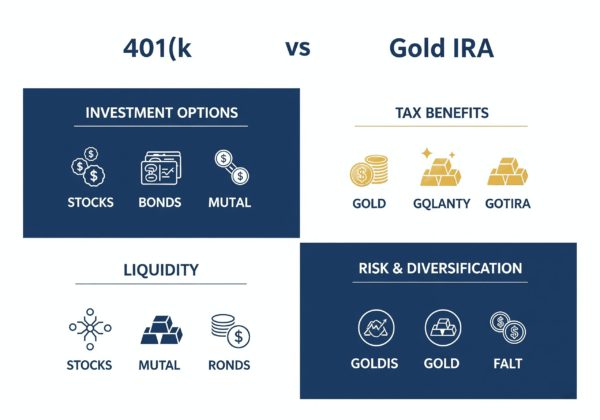Last Updated: November 18, 2025
Managing over a million dollars isn’t just about picking the right stocks it’s about preserving and growing wealth through strategic planning. From minimizing taxes to setting up generational trusts, high-net-worth individuals (HNWIs) need more than a generic investment app. The stakes are higher, and so are the opportunities.
In 2025, financial advisory services tailored to HNWIs are more accessible and more competitive than ever before. Whether you’re a tech entrepreneur cashing out or a real estate investor diversifying your portfolio, finding the right advisor can make or break your financial future. The best wealth managers offer not just investment advice but comprehensive estate, tax, and retirement planning.
But with hundreds of firms out there claiming to be “exclusive” or “elite,” it’s hard to know who really delivers. Some charge hidden fees, while others push one-size-fits-all solutions. That’s why this guide breaks down the top-rated financial advisors for individuals with $1M+ in assets based on real services, real value, and real trust.
If you’re looking for a fiduciary who understands high-net-worth needs from private investments to tax optimization you’re in the right place. We’ve ranked and compared the top financial advisory firms in the U.S. that cater to serious investors. Let’s help you protect, grow, and pass on your wealth the smart way.
Who Is Considered a High-Net-Worth Individual in 2025?
When it comes to personal finance, not all investors operate on the same playing field. As your wealth grows, so do your needs and that’s where the high-net-worth classification becomes essential. In 2025, wealth management firms are tailoring their services based on your net worth tier, offering more specialized strategies as your investable assets increase.
High-net-worth individuals, or HNWIs, are typically defined as those with $1 million or more in liquid, investable assets not including the value of your home. This group represents a small yet financially powerful segment that needs more than basic investment advice. They often seek advanced planning to protect, preserve, and grow their capital over the long term.
Tier 1: HNWIs ($1M–$5M in Investable Assets)
This first tier of high-net-worth status includes individuals or couples who have accumulated between $1 million and $5 million in liquid assets. This wealth level opens the door to more tailored financial services, but also requires better planning to protect against inflation, taxes, and market volatility.
Most HNWIs in this range are still growing their portfolios and planning for retirement, legacy creation, or large one-time financial events like a business sale or second home purchase. They may also begin seeking access to private wealth advisors, diversified portfolios, and more tax-efficient investment vehicles.
While they may not need full family office services, these individuals benefit greatly from customized financial planning, including estate strategies, trust setup, and retirement optimization. Choosing a fiduciary advisor early at this stage can help reduce unnecessary fees and keep more of their wealth working.
Tier 2: Very High-Net-Worth Individuals (VHNWIs – $5M–$30M)
Once your investable wealth reaches the $5 million to $30 million range, financial priorities shift even further. You’re no longer just focused on growth now, preservation, legacy, and tax efficiency take center stage.
Very high-net-worth individuals typically gain access to private wealth services, such as concierge banking, tax strategists, and in-house estate planners. At this level, advisors often recommend multi-generational planning tools such as dynasty trusts, donor-advised funds, and complex estate structures.
This group also begins diversifying heavily into private equity, venture capital, hedge funds, or institutional-grade real estate. These investments, often unavailable to retail clients, can offer higher returns and unique advantages but they require careful vetting, long-term thinking, and deep due diligence.
Tier 3: Ultra-High-Net-Worth Individuals (UHNWIs – $30M+ in Assets)
When you cross the $30 million threshold, your financial world becomes exponentially more complex. This is the realm of family offices, multi-generational wealth planning, and international investment strategies — not just high-net-worth services, but ultra-specialized solutions.
Ultra-high-net-worth individuals often need custom-built financial structures involving legal experts, global tax advisors, and elite investment managers. Their financial footprint might include overseas accounts, luxury assets (such as art or aircraft), business holdings, and philanthropic foundations.
Advisory firms serving UHNWIs typically offer white-glove service through full-service teams that handle everything from risk management to succession planning. Confidentiality, control, and capital preservation are top priorities alongside strategic giving and building a long-lasting legacy that reflects personal values.
The Bottom Line: Why Your Wealth Tier Matters
Understanding where you fall on the high-net-worth spectrum helps you identify the level of service and strategy you actually need. A $2M portfolio requires different tools than a $50M estate and using the right resources can make a massive difference in outcomes.
As your wealth grows, so should the sophistication of your advisory team. Working with a firm that understands your net worth tier ensures you receive tailored advice, access to exclusive opportunities, and optimized planning across every area of your finances.
Whether you’re entering the HNWI threshold or managing generational wealth at the UHNW level, your financial roadmap should reflect your goals, risk tolerance, and long-term legacy. In 2025, the smartest investors are choosing advisors who understand that one-size-fits-all no longer works.
| Pros | Cons |
|---|---|
| Empower: Combines modern tools with human advisors, ideal for HNWIs seeking hybrid planning and portfolio tracking. | Not as personalized as boutique firms; remote-based service may lack face-to-face concierge experience. |
| Vanguard PAS: Extremely low annual fee (0.30%) with trusted fiduciary service, great for long-term passive investors. | Lacks access to hedge funds or alternative investments, limited hands-on estate planning support. |
| Fisher Investments: Offers proactive portfolio strategies, global asset allocation, and personalized account management. | Fees start higher than passive models (~1.25%), and not ideal for hands-off or index-focused investors. |
| Creative Planning: Combines financial, tax, and legal services under one roof—ideal for complex wealth planning. | Comprehensive services may be more than needed for simpler portfolios; slightly higher cost if not fully used. |
| Abbot Downing: Exclusive private banking and legacy services for UHNW families with $50M+ in assets. | Extremely high minimums; not suitable for most HNWIs and may feel outdated for fintech-savvy investors. |
Best High-Net-Worth Financial Advisors in 2025
Choosing the right financial advisor can make a major difference in how you grow, protect, and transfer your wealth. But for high-net-worth individuals, not every advisory firm is built the same. The best advisors offer personalized service, advanced planning, and access to exclusive investment strategies.
In this section, we’ve handpicked the top wealth advisory platforms in 2025 that are trusted by clients with $1M+ in investable assets. These firms stand out for their fiduciary approach, specialized planning, transparent pricing, and high-touch service models. Whether you’re focused on legacy, growth, or tax efficiency there’s a solution for your wealth tier.
Empower (Formerly Personal Capital)
Best for: Tech-driven investors who want both digital tools and a dedicated wealth advisor.
Empower blends human expertise with smart financial technology, offering a powerful dashboard and holistic planning. Once your portfolio reaches $1 million or more, you get access to personal wealth managers with fiduciary responsibility. Their platform includes everything from cash flow tracking to net worth monitoring.
For HNWIs, Empower offers custom investment strategies, tax-efficient portfolio management, and estate planning support. The service also includes retirement goal analysis and charitable giving planning. Their advisory fees start at 0.49% and drop with higher balances, making them competitive for long-term clients.
Clients enjoy the flexibility of remote meetings with licensed advisors, allowing for convenience without sacrificing quality. Empower is ideal for investors who want transparency, performance tracking, and fiduciary advice in one modern platform. You can also access private equity research and estate modeling tools.
Because of its hybrid model and massive AUM (over $20 billion), Empower has become a popular choice for both emerging HNWIs and those well above the $5M mark. Their affiliate program also allows finance publishers to promote Empower and earn from high-converting traffic.

Vanguard Personal Advisor Services (PAS)
Best for: Long-term investors who want low fees and trusted fiduciary guidance.
Vanguard has built its reputation on low-cost, index-based investing and its Personal Advisor Services extend this to wealthier investors. Once your assets cross $1M, you’re eligible for Vanguard’s Private Advisor tier, which includes a dedicated CFP® professional and fully customized financial planning.
The fee structure is incredibly competitive at 0.30% annually, which is significantly lower than most traditional firms. This makes Vanguard ideal for HNWIs who want to preserve wealth over decades without losing it to high advisory costs. The focus is on efficient, evidence-based investment portfolios.
Vanguard also provides estate planning support, tax-loss harvesting, college funding plans, and charitable giving strategies. While the platform isn’t flashy, it’s deeply trusted and has over $350 billion in managed assets under this advisory model. Their fiduciary standard ensures advice is always aligned with your goals.
Though less personalized than boutique wealth firms, Vanguard PAS shines for disciplined investors who prioritize low fees, passive growth, and long-term wealth preservation. It’s especially strong for HNW families focused on retirement and intergenerational financial security.
Fisher Investments
Best for: Proactive portfolio management and global investment strategies.
Founded by financial columnist Ken Fisher, this firm has earned a solid reputation for hands-on management. Fisher Investments offers personalized portfolio construction, economic forecasting, and active asset allocation for clients with $500K to $30M+ in investable assets.
Their services include retirement planning, tax efficiency, portfolio rebalancing, and client education. You’ll work with a dedicated advisor supported by a full research team, and every portfolio is adjusted based on global economic data. This makes it suitable for growth-focused HNWIs who value strategy and analysis.
Fisher’s fees are typically around 1.25% but decrease for larger accounts, and they don’t charge performance-based commissions. They are also strictly fiduciary, meaning they are legally obligated to act in your best interest. Their transparent, client-focused approach has helped them manage over $200 billion in assets.
This advisor is a strong choice if you’re looking for active management, regular communication, and tailored strategies for complex wealth. While it’s more traditional in service delivery, Fisher’s investment philosophy appeals to clients who don’t want to “set it and forget it.”
Creative Planning
Best for: All-in-one wealth, tax, legal, and estate planning under one roof.
Creative Planning is a full-service advisory firm offering a deeply integrated approach to managing high-net-worth portfolios. With services that combine investment management, CPA-level tax planning, and estate law, they’re one of the few firms offering a comprehensive wealth ecosystem.
For clients with $500K to $50M+, Creative Planning builds individualized strategies based on your family, lifestyle, and future goals. Whether you’re dealing with real estate holdings, business equity, or international assets, their in-house team works together to simplify your financial life.
They are fully fiduciary and charge flat, tiered AUM-based fees depending on your account size. Clients receive detailed reports, tax strategy guidance, and personal access to wealth managers, CPAs, and estate attorneys. It’s like having a family office — without needing $100M+.
Creative Planning is ideal for those who want high-level customization, integrated services, and professional support across every area of wealth. If you value convenience, confidentiality, and holistic financial care, this firm is a smart choice in 2025.
Abbot Downing (Wells Fargo Private Bank)
Best for: Ultra-wealthy clients with $50M+ in assets seeking white-glove family office services.
Abbot Downing is the boutique division of Wells Fargo that serves ultra-high-net-worth clients, including entrepreneurs, multigenerational families, and foundations. This service level includes everything from philanthropy planning to art appraisal, legacy education, and business succession consulting.
Their services go far beyond investing they provide multi-generational wealth transfer plans, custom trusts, and global tax structuring. The firm often works with attorneys, real estate advisors, and institutional consultants to build ultra-personalized wealth strategies.
Minimum investable assets start around $50 million, and clients typically get assigned a private team that includes bankers, advisors, estate planners, and legal experts. It’s essentially a custom-built family office, tailored around lifestyle, legacy, and values.
Abbot Downing is best for UHNW families who require a deep bench of specialized professionals, full confidentiality, and long-term stewardship of legacy assets. It’s not for emerging millionaires it’s for those who’ve already built a dynasty and want to preserve it across generations.
Key Considerations When Choosing a High-Net-Worth Financial Advisor
Selecting the right financial advisor is one of the most important decisions a high-net-worth individual can make. With millions in assets on the line, you need more than just a basic planner you need someone who understands complex wealth and puts your goals first. Here are the top things to look for when evaluating advisors in 2025.
Fiduciary Duty Matters More Than Ever
Not all financial advisors are legally required to act in your best interest. That’s why it’s crucial to work with a fiduciary advisor someone who is bound by law to prioritize your financial well-being over commissions or product sales.
Fiduciary advisors are typically registered investment advisors (RIAs) or certified financial planners (CFPs). Unlike brokers who may earn commissions on financial products, fiduciaries recommend solutions based solely on what’s best for your situation.
Working with a fiduciary means your wealth is guided by objective advice, not sales incentives. It’s a level of trust that high-net-worth investors can’t afford to overlook.
Transparent Fee Structures Are Non-Negotiable
One of the biggest mistakes HNWIs make is not fully understanding what they’re being charged. Many firms advertise low fees upfront but sneak in tiered AUM charges, hidden fund costs, or onboarding fees that eat away at your returns.
Ask for a full fee breakdown before signing with any advisor. Understand whether you’re paying a flat rate, a percentage of assets under management (AUM), or any performance-based fees. Watch out for layered costs tied to third-party funds or custodians.
A transparent fee model allows you to calculate the true cost of managing your portfolio — and ensures you’re not overpaying for services you don’t use.
Customization Is Critical at the HNW Level
High-net-worth individuals have unique needs that simply don’t fit into cookie-cutter portfolios. Whether you own a business, hold multiple properties, or invest globally, your financial strategy should reflect your personal goals and lifestyle.
Look for firms that offer tailored portfolio design, advanced tax planning, and integrated estate strategies. A good advisor will dive deep into your goals, risk tolerance, legacy plans, and even family dynamics.
The best firms take the time to build a financial plan that evolves as your wealth and life grows. This kind of customization is a hallmark of high-quality wealth management.
Modern Technology and Real-Time Reporting
In today’s fast-moving markets, visibility is key. The top advisory firms offer robust digital tools that give you real-time access to portfolio performance, tax summaries, and asset allocation.
Secure client dashboards let you track your investments 24/7, generate reports, and communicate directly with your advisory team. These tools are especially valuable for HNWIs managing assets across multiple accounts or family members.
Beyond transparency, top-tier tech platforms also prioritize cybersecurity and data encryption, protecting your wealth and personal information from potential breaches.
Access to Alternative Investments
Once your portfolio crosses the seven-figure mark, traditional stocks and bonds may no longer be enough. High-net-worth individuals often benefit from alternative assets like private equity, hedge funds, venture capital, or income-generating real estate.
These investments can offer higher returns and lower correlation with public markets but they also require expert vetting, longer lock-in periods, and careful liquidity management.
Make sure your advisor can connect you with institutional-quality opportunities, provide due diligence, and explain the risks clearly. Diversifying with alternatives can significantly enhance long-term wealth if done right.
Real-Life Scenario: Navigating Financial Choices with $2.5 Million in Assets
Meet Jordan, a 48-year-old entrepreneur who has recently sold his SaaS company, now sitting on $2.5 million in liquid investments. With this substantial windfall, Jordan faces several critical financial decisions: how to minimize hefty capital gains taxes, plan for his children’s upcoming college expenses, establish a meaningful charitable foundation, and diversify his portfolio with real estate and safer fixed-income assets.
Jordan began his search by comparing popular advisors like Empower, known for its tech-forward platform, and Fisher Investments, famous for active portfolio management. However, he ultimately selected Creative Planning. Why? Because their comprehensive approach includes in-house tax attorneys, access to family office services, and specialized real estate investment partnerships — all vital for his complex needs.
Though Creative Planning’s fees were a bit higher, Jordan valued the peace of mind and tailored expertise that came with personalized tax strategies and wealth preservation. His choice highlights how, for many high-net-worth investors, paying a premium for integrated, specialized advice often leads to better long-term financial outcomes.
Final Thoughts
Choosing the right financial advisor is a critical step for anyone managing significant wealth. High-net-worth individuals face complex challenges that require expert guidance tailored to their unique goals, tax situations, and legacy plans. By selecting a fiduciary advisor who offers transparent fees, personalized strategies, and access to exclusive investment opportunities, you set yourself up for long-term financial success.
In 2025, the wealth management landscape continues to evolve with new technology, alternative asset classes, and regulatory changes. Staying informed and partnering with an advisor who understands these dynamics will help you navigate market volatility and protect your family’s future.
Ultimately, your financial advisor should be more than just a portfolio manager — they should be a trusted partner, committed to growing, preserving, and transferring your wealth according to your vision. Take the time to evaluate your options carefully, and choose a firm that aligns with your values and ambitions.
If you’re ready to take the next step, explore the advisors we’ve highlighted and consider scheduling consultations to find the best fit for your high-net-worth journey.
Explore Related Guides:
- How Ultra-High-Net-Worth Individuals Protect Wealth in 2025
- Best Private Banking Services for $1M+ Investors
- Top U.S. Tax Strategies for HNW U.S. Entrepreneurs








